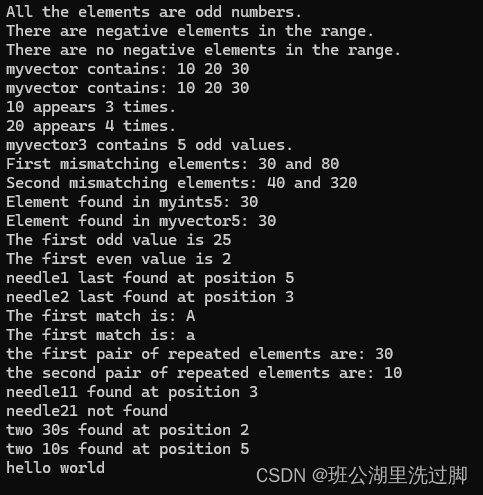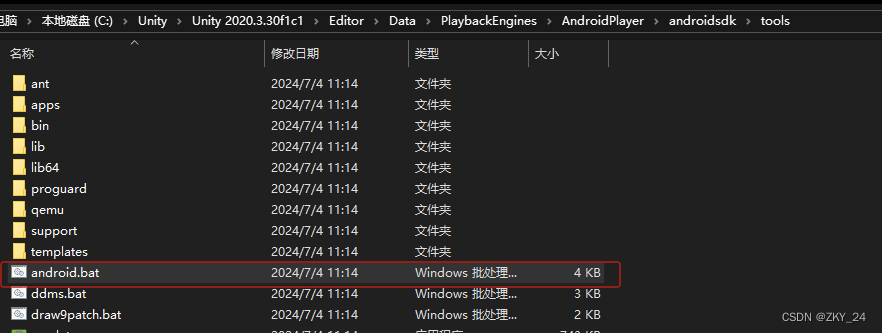algorithm此头文件是算法库的一部分。本篇介绍不修改序列的操作函数。
不修改序列的操作 | |
| all_ofany_ofnone_of (C++11)(C++11)(C++11) | 检查谓词是否对范围中所有、任一或无元素为 true (函数模板) |
| for_each | 应用函数到范围中的元素 (函数模板) |
| for_each_n (C++17) | 应用一个函数对象到序列的前 n 个元素 (函数模板) |
| countcount_if | 返回满足指定判别标准的元素数 (函数模板) |
| mismatch | 寻找两个范围出现不同的首个位置 (函数模板) |
| findfind_iffind_if_not (C++11) | 寻找首个满足特定判别标准的元素 (函数模板) |
| find_end | 在特定范围中寻找最后出现的元素序列 (函数模板) |
| find_first_of | 搜索元素集合中的任意元素 (函数模板) |
| adjacent_find | 查找首对相邻的相同(或满足给定谓词的)元素 (函数模板) |
| search | 搜索一个元素范围 (函数模板) |
| search_n | 在范围中搜索一定量的某个元素的连续副本 (函数模板) |
示例代码:
#include <algorithm>
#include <functional>
#include <iostream>
#include <iterator>
#include <utility> // std::pair
#include <vector>
#include <array>
#include <cctype> // std::tolower
void myfunction(int i) { // function:
std::cout << ' ' << i;
}
struct myclass { // function object type:
void operator() (int i) { std::cout << ' ' << i; }
} myobject;
bool IsOdd(int i) { return ((i % 2) == 1); }
bool mypredicate(int i, int j) {
return (i == j);
}
bool myfunction8(int i, int j) {
return (i == j);
}
bool comp_case_insensitive9(char c1, char c2) {
return (std::tolower(c1) == std::tolower(c2));
}
bool myfunction10(int i, int j) {
return (i == j);
}
bool mypredicate11(int i, int j) {
return (i == j);
}
bool mypredicate12(int i, int j) {
return (i == j);
}
int main()
{
// all_of example 检查谓词是否对范围中所有、任一或无元素为 true
std::array<int, 8> foo = { 3,5,7,11,13,17,19,23 };
if (std::all_of(foo.begin(), foo.end(), [](int i) {return i % 2; }))
std::cout << "All the elements are odd numbers.\n";
// any_of example
std::array<int, 7> foo2 = { 0,1,-1,3,-3,5,-5 };
if (std::any_of(foo2.begin(), foo2.end(), [](int i) {return i < 0; }))
std::cout << "There are negative elements in the range.\n";
// none_of example
std::array<int, 8> foo3 = { 1,2,4,8,16,32,64,128 };
if (std::none_of(foo3.begin(), foo3.end(), [](int i) {return i < 0; }))
std::cout << "There are no negative elements in the range.\n";
// for_each example 应用函数到范围中的元素
std::vector<int> myvector;
myvector.push_back(10);
myvector.push_back(20);
myvector.push_back(30);
std::cout << "myvector contains:";
for_each(myvector.begin(), myvector.end(), myfunction);
std::cout << '\n';
// or:
std::cout << "myvector contains:";
for_each(myvector.begin(), myvector.end(), myobject);
std::cout << '\n';
// count algorithm example 返回满足指定判别标准的元素数
// counting elements in array:
int myints[] = { 10,20,30,30,20,10,10,20,10,20 }; // 8 elements
int mycount = std::count(myints, myints + 8, 10);
std::cout << "10 appears " << mycount << " times.\n";
// counting elements in container:
std::vector<int> myvector2(myints, myints + 10);
mycount = std::count(myvector2.begin(), myvector2.end(), 20);
std::cout << "20 appears " << mycount << " times.\n";
// count_if example
std::vector<int> myvector3;
for (int i = 1; i < 10; i++) myvector3.push_back(i); // myvector: 1 2 3 4 5 6 7 8 9
int mycount3 = count_if(myvector3.begin(), myvector3.end(), IsOdd);
std::cout << "myvector3 contains " << mycount3 << " odd values.\n";
// mismatch algorithm example 寻找两个范围出现不同的首个位置
std::vector<int> myvector4;
for (int i = 1; i < 6; i++) myvector4.push_back(i * 10); // myvector4: 10 20 30 40 50
int myints4[] = { 10,20,80,320,1024 }; // myints4: 10 20 80 320 1024
std::pair<std::vector<int>::iterator, int*> mypair4;
// using default comparison:
mypair4 = std::mismatch(myvector4.begin(), myvector4.end(), myints4);
std::cout << "First mismatching elements: " << *mypair4.first;
std::cout << " and " << *mypair4.second << '\n';
++mypair4.first; ++mypair4.second;
// using predicate comparison:
mypair4 = std::mismatch(mypair4.first, myvector4.end(), mypair4.second, mypredicate);
std::cout << "Second mismatching elements: " << *mypair4.first;
std::cout << " and " << *mypair4.second << '\n';
// find example
// using std::find with array and pointer:
int myints5[] = { 10, 20, 30, 40 };
int *p;
p = std::find(myints5, myints5 + 4, 30);
if (p != myints5 + 4)
std::cout << "Element found in myints5: " << *p << '\n';
else
std::cout << "Element not found in myints5\n";
// using std::find with vector and iterator:
std::vector<int> myvector5(myints5, myints5 + 4);
std::vector<int>::iterator it;
it = find(myvector5.begin(), myvector5.end(), 30);
if (it != myvector5.end())
std::cout << "Element found in myvector5: " << *it << '\n';
else
std::cout << "Element not found in myvector5\n";
// find_if example
std::vector<int> myvector6;
myvector6.push_back(10);
myvector6.push_back(25);
myvector6.push_back(40);
myvector6.push_back(55);
std::vector<int>::iterator it6 = std::find_if(myvector6.begin(), myvector6.end(), IsOdd);
std::cout << "The first odd value is " << *it6 << '\n';
// find_if_not example
std::array<int, 5> foo7 = { 1,2,3,4,5 };
std::array<int, 5>::iterator it7 = std::find_if_not(foo7.begin(), foo7.end(), [](int i) {return i % 2; });
std::cout << "The first even value is " << *it7 << '\n';
// find_end example
int myints8[] = { 1,2,3,4,5,1,2,3,4,5 };
std::vector<int> haystack8(myints8, myints8 + 10);
int needle1[] = { 1,2,3 };
// using default comparison:
std::vector<int>::iterator it8;
it8 = std::find_end(haystack8.begin(), haystack8.end(), needle1, needle1 + 3);
if (it8 != haystack8.end())
std::cout << "needle1 last found at position " << (it8 - haystack8.begin()) << '\n';
int needle2[] = { 4,5,1 };
// using predicate comparison:
it8 = std::find_end(haystack8.begin(), haystack8.end(), needle2, needle2 + 3, myfunction8);
if (it8 != haystack8.end())
std::cout << "needle2 last found at position " << (it8 - haystack8.begin()) << '\n';
// find_first_of example
int mychars9[] = { 'a','b','c','A','B','C' };
std::vector<char> haystack9(mychars9, mychars9 + 6);
std::vector<char>::iterator it9;
int needle9[] = { 'A','B','C' };
// using default comparison:
it9 = find_first_of(haystack9.begin(), haystack9.end(), needle9, needle9 + 3);
if (it9 != haystack9.end())
std::cout << "The first match is: " << *it9 << '\n';
// using predicate comparison:
it9 = find_first_of(haystack9.begin(), haystack9.end(),
needle9, needle9 + 3, comp_case_insensitive9);
if (it9 != haystack9.end())
std::cout << "The first match is: " << *it9 << '\n';
// adjacent_find example
int myints10[] = { 5,20,5,30,30,20,10,10,20 };
std::vector<int> myvector10(myints10, myints10 + 8);
std::vector<int>::iterator it10;
// using default comparison:
it10 = std::adjacent_find(myvector10.begin(), myvector10.end());
if (it10 != myvector10.end())
std::cout << "the first pair of repeated elements are: " << *it10 << '\n';
//using predicate comparison:
it10 = std::adjacent_find(++it10, myvector10.end(), myfunction10);
if (it10 != myvector10.end())
std::cout << "the second pair of repeated elements are: " << *it10 << '\n';
// search algorithm example
std::vector<int> haystack11;
// set some values: haystack11: 10 20 30 40 50 60 70 80 90
for (int i = 1; i < 10; i++)
haystack11.push_back(i * 10);
// using default comparison:
int needle11[] = { 40,50,60,70 };
std::vector<int>::iterator it11;
it11 = std::search(haystack11.begin(), haystack11.end(), needle11, needle11 + 4);
if (it11 != haystack11.end())
std::cout << "needle11 found at position " << (it11 - haystack11.begin()) << '\n';
else
std::cout << "needle11 not found\n";
// using predicate comparison:
int needle21[] = { 20,30,50 };
it11 = std::search(haystack11.begin(), haystack11.end(), needle21, needle21 + 3, mypredicate11);
if (it11 != haystack11.end())
std::cout << "needle21 found at position " << (it11 - haystack11.begin()) << '\n';
else
std::cout << "needle21 not found\n";
// search_n example
int myints12[] = { 10,20,30,30,20,10,10,20 };
std::vector<int> myvector12(myints12, myints12 + 8);
std::vector<int>::iterator it12;
// using default comparison:
it12 = std::search_n(myvector12.begin(), myvector12.end(), 2, 30);
if (it12 != myvector12.end())
std::cout << "two 30s found at position " << (it12 - myvector12.begin()) << '\n';
else
std::cout << "match not found\n";
// using predicate comparison:
it12 = std::search_n(myvector12.begin(), myvector12.end(), 2, 10, mypredicate12);
if (it12 != myvector12.end())
std::cout << "two 10s found at position " << int(it12 - myvector12.begin()) << '\n';
else
std::cout << "match not found\n";
std::cout << "hello world\n";
return 0;
}
运行结果:

参考:
https://cplusplus.com/reference/algorithm/
https://zh.cppreference.com/w/cpp/header/algorithm



















